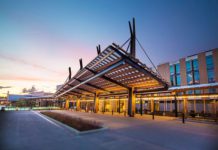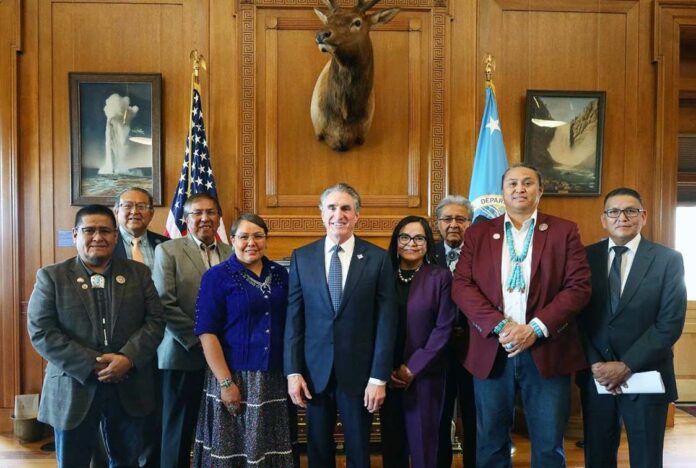WASHINGTON, D.C. – Members of the 25th Navajo Nation Council’s Resources and Development Committee (RDC), along with Speaker Crystalyne Curley, met with U.S. Secretary of the Interior Doug Burgum to advance urgent tribal priorities. The consultation focused on the impacts of Public Land Order No. 7923 (the Chaco Canyon land withdrawal), the ongoing crisis of abandoned uranium mines, and the Northeastern Arizona Indian Water Rights Settlement Act (NAIWRSA).
Speaker Curley underscored the importance of collaborative federal action. “We are here to elevate the needs of our communities that include basic needs like clean drinking water, access to infrastructure, and fair treatment of our landowners,” she said. “We are seeking partnership and action, not more delays.”
Council Delegate Danny Simpson, who represents communities directly impacted by the Chaco Canyon land withdrawal, expressed deep concern over the lack of consultation with Navajo leadership and allottees before the enactment of Public Land Order No. 7923. “The buffer zone undermines the economic self-sufficiency of over 4,000 Navajo allottees who own both surface and subsurface rights,” said Simpson. “These are families who have lived and worked on these lands for generations. Chaco is already protected. The additional ten miles only serves to restrict our people further.”
RDC Chair Brenda Jesus added that the withdrawal has stalled key infrastructure like water lines, electricity, and roads. “Our homes, our roads, and our ability to thrive are now locked behind a decision we were not included in,” said Jesus. “Every surrounding chapter passed resolutions opposing this buffer. We are not anti-preservation. We simply want our people to be heard and respected.”
Eastern Navajo Agency Council Representative Ervin Chavez is an allottee who attended the meeting and said that the decision ignored long-standing advocacy from local leaders. “The people who made this decision don’t live in these communities,” said Chavez. “They froze us in time while ignoring our reports, our resolutions, and our voices.”
Discussion shifted to the legacy of abandoned uranium mines, where Council Delegate Casey Allen Johnson shared his personal experience. “There are 111 abandoned uranium mines in my region alone,” said Johnson. “I lost both of my parents to cancer that we believe was caused by uranium exposure. Our people have been stuck in study after study for years. We need real cleanup and real accountability.”
According to the Navajo Environmental Protection Agency, more than 500 contaminated sites have been identified, yet construction and remediation have not begun. Committee members pressed for federal support to transition from assessments to actual cleanup.
Delegates also stressed that water access remains one of the Nation’s most urgent needs. Speaker Curley noted that about one-third of Navajo residents still live without safe drinking water, sharing her own experience hauling hundreds of gallons weekly for household use. “We helped build major cities across the Southwest, including Los Angeles, Phoenix, and Las Vegas, but now we’re left at the end of the water line,” said Curley. “NAIWRSA and the Navajo-Gallup Water Supply Project are not just legislative priorities. They are survival priorities.”
Chair Jesus noted that the Nation has worked in good faith with the seven Colorado River Basin states for decades and that now is the time to finalize a settlement guaranteeing Navajo water rights.
Secretary Burgum acknowledged the concerns and emphasized the need to move from studies to implementation. As Chair of the National Energy Dominance Council, he highlighted the potential for increased interagency coordination to advance cleanup and development. “We are committed to being partners in this effort and ensuring the Interior Department takes meaningful steps forward,” said Burgum.















































